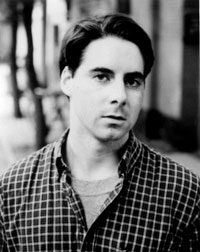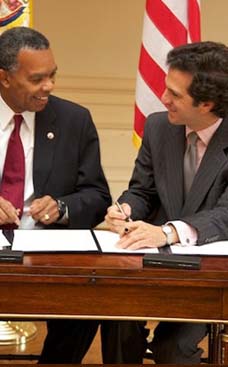
His new book is an exploration of China's burgeoning highway system, and it definitely contains some epic drives: Mr. Hessler, for example, undertakes a 7,000-mile trip across northern China, following the Great Wall all the way from the East China Sea to the Tibetan plateau, his rental car packed with a tent and food supplies that will make your teeth ache: Coca-Cola, Oreo cookies, candy bars, Gatorade. But "Country Driving" isn't really an Asian version of William Least Heat-Moon's "Blue Highways." Mr. Hessler's book is more ambitious than its subtitle makes it sound. This work is as much about staying put - about hunkering down and observing - as it is about barreling down the highway. Mr. Hessler spends years in a small farming village in the mountains north of Beijing, and more years in a quickly growing city in southeastern China. He watches, and takes careful notes, as both places are irrevocably changed by major new expressways. And every now and again he hits the road himself. The big story Mr. Hessler has to tell in "Country Driving" is about a country that's feverishly on the move. Speaking of the early years of the last decade, he writes, "To drive across China was to find yourself in the middle of the largest migration in human history - nearly one-tenth of the population was on the road, finding new lives away from home." His book chronicles the flight from rural China, and from farming and folkways, to new cities and their sprouting factories. Author Peter Hessler served as a Peace Corps Volunteer in China.
The New York Times reviews Peter Hessler's "A Journey Through China From Farm to Factory "
Feeling at Sea on the Roads of New China
By DWIGHT GARNER
Published: February 23, 2010
American travel writers over the past century have taken special delight in describing the intricacies, and the lunatic comedy, of driving etiquette in foreign countries. Some enterprising publisher is bound to scoop up the best of these observations and issue a queasy-making anthology: "Carsick: A Global Reader."
When that anthology does arrive, Peter Hessler's new book, "Country Driving: A Journey Through China From Farm to Factory," deserves a special place in it. It's not merely that Mr. Hessler convinces us that the Chinese, being new to driving, are simply awful at it. He makes the additional, and delightful, case that perhaps no other people "take such joy in driving badly."
The Chinese rarely use turn signals or windshield wipers or seat belts or headlights. They tailgate and honk like mad. "People pass on hills; they pass on turns; they pass in tunnels," Mr. Hessler writes. "If they get passed themselves, they immediately try to pass the other vehicle back, as if it were a game."
The Chinese government is little help. Traffic lights are occasionally mistimed, Mr. Hessler notes, showing green in all directions. A left turn lane might be on the far right side of the road. Highway patrols are so rare that officials put fiberglass statues of police officers at some intersections, to function like traffic-calming human scarecrows. Get a dent? Hop out and haggle for an instant settlement.
Mr. Hessler is a staff writer for The New Yorker, and he was that magazine's Beijing correspondent from 2000 to 2007. "Country Driving" is his third book about China, after "River Town" (2001), which was about two years he spent there teaching English while in the Peace Corps, and "Oracle Bones" (2006), a multi-layered survey of that country's past and present.
His new book is an exploration of China's burgeoning highway system, and it definitely contains some epic drives: Mr. Hessler, for example, undertakes a 7,000-mile trip across northern China, following the Great Wall all the way from the East China Sea to the Tibetan plateau, his rental car packed with a tent and food supplies that will make your teeth ache: Coca-Cola, Oreo cookies, candy bars, Gatorade.
But "Country Driving" isn't really an Asian version of William Least Heat-Moon's "Blue Highways." Mr. Hessler's book is more ambitious than its subtitle makes it sound. This work is as much about staying put - about hunkering down and observing - as it is about barreling down the highway.
Mr. Hessler spends years in a small farming village in the mountains north of Beijing, and more years in a quickly growing city in southeastern China. He watches, and takes careful notes, as both places are irrevocably changed by major new expressways. And every now and again he hits the road himself.
The big story Mr. Hessler has to tell in "Country Driving" is about a country that's feverishly on the move. Speaking of the early years of the last decade, he writes, "To drive across China was to find yourself in the middle of the largest migration in human history - nearly one-tenth of the population was on the road, finding new lives away from home." His book chronicles the flight from rural China, and from farming and folkways, to new cities and their sprouting factories.
The story of this emerging China has been told before, of course, by other writers, and by Mr. Hessler himself, in his previous books and magazine journalism. But the reporting in "Country Driving" is impressive in its scope. This book contains dozens of characters and multiple set-pieces and subplots. Along the way Mr. Hessler delivers eloquent disquisitions on everything from how to buy a used car in China and what hospital stays are like to the history of the Mongol conquest and the pros and cons of the Great Wall as a defensive structure.
Mr. Hessler is an impeccable compiler of facts, in the John McPhee Eagle Scout mold, and he lays these facts out elegantly. There are moments when you worry he is making a fetish of his clear, careful sentences, moments when tidiness comes awfully close to somnambulance. There isn't much libido in Mr. Hessler's writing - not a lot of passion, not much self-revelation.
But like the quiet kid in the back of the classroom who ultimately becomes the best man at your wedding, Mr. Hessler, with his good-naturedness and tact, grows on you. So does his sly humor, which accumulates slowly, like the toothsome crust at the bottom of a rice pot. After picking up his share of hitchhikers in northern China, he begins to define the smell of the sickly-sweet perfume the women often wear: "Eau de Inner Mongolia."
And after explaining how Chinese rental car agencies, exasperatingly, ask you to return a car with exactly as much gas as was in it when you drove away, rather than returning it full, he writes: "The Chinese people had invented the compass, paper, the printing press, gunpowder, the seismograph, the crossbow and the umbrella; they had sailed to Africa in the 15th century; they had constructed the Great Wall; over the past decade they had built their economy at a rate never before seen in the developing world. They could return a car with exactly three-eighths of a tank of gas, but filling it was apparently beyond the realm of cultural possibility."
As Mr. Heller makes his way across China in a series of rental cars, watching trucks blow past him, he observes that almost any product we buy in the developed world has "probably already spent time on a Chinese road, and someday it may return there to be recycled."
He mourns the countryside that is rapidly vanishing in China, but he also admires the grit of the rural people who escape. "They had a gift for self-invention," he writes, "that rivaled anything in Dickens."
"Country Driving" is most affecting in its portrayal of lives ripped up at the roots, sometimes for the better, sometimes not. He describes the "hollow feeling" many Chinese have, because rapid change has left them exhausted and uncertain.
Peter Hessler is a fine tour guide for the new China, a writer who is capable of tossing aside the country's (deplorable) maps and admitting: "In China, it's not such a terrible thing to be lost, because nobody else knows exactly where they're going, either."












